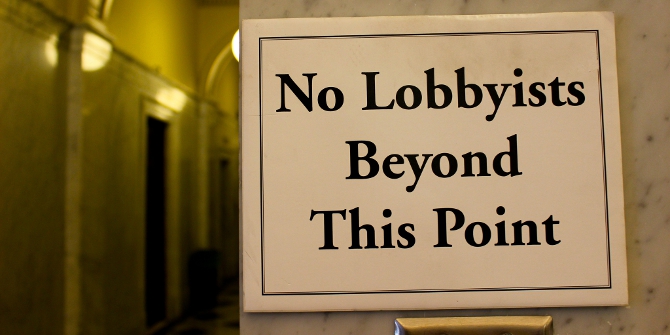 While lobbying has been part of politics in Washington D.C for decades, in recent years the number of corporations and groups that lobby has shot up, with more than $2 billion spent on lobbying in 2014. While this lobbying is legal, is it ethical? Thomas T. Holyoke attempts to define ethical lobbying and suggests reforms to the nation’s lobbying laws. He argues that increasing transparency and accountability so that those who lobbyists represent know what is being lobbied for on their behalf will help push lobbyists to behave more ethically.
While lobbying has been part of politics in Washington D.C for decades, in recent years the number of corporations and groups that lobby has shot up, with more than $2 billion spent on lobbying in 2014. While this lobbying is legal, is it ethical? Thomas T. Holyoke attempts to define ethical lobbying and suggests reforms to the nation’s lobbying laws. He argues that increasing transparency and accountability so that those who lobbyists represent know what is being lobbied for on their behalf will help push lobbyists to behave more ethically.
Americans do not like lobbyists, the shadowy figures apparently pressuring gutless lawmakers into serving wealthy special interests at the public’s expense. In a 2013 CBS / New York Times poll, 85 percent indicated that Congress was more interested in helping lobbyists than their constituents. Yet the truth is that lobbyists provide representation for thousands of Americans who would be lost in Washington if left to their own devices. American politics, though, requires compromise to work, and lobbyists are often pressured into compromising the desires of the people they represent to accommodate lawmakers. But if lobbying is representation, then these compromises may be inherently unethical.
Growth in lobbying
Lobbying is Washington, DC’s growth industry. In 1900 there were just a couple hundred interest groups in the nation’s capital, but by 2011 the database lobbyists.org recorded over 7,000. Counting the number of corporations and other entities that lobby, the number is over 15,000. Moreover, lobbyists.org lists over 19,000 people employed in Washington as lobbyists, which still fails to account for the thousands of public relations specialists, researchers, grassroots organizers, and former members of Congress acting as consultants that all make up modern lobbying. Finally, the Center for Responsive Politics estimates that in 2014 $2.41 billion was spent on lobbying Congress.
What about this should concern us? Jack Abramoffs deliberately lying to their clients to extort money? Yes, and a lot more. Abramoffs are rare; the real concern is over something many might write-off as the everyday give and take of politics. The policy compromises that lobbyists, lawmakers, and everyone else socialized into Washington culture take for granted often come as disturbing shocks to the people lobbyists represent. Environmentalists wanting forests walled off from all development might be stunned to hear that their lobbyists compromised by allowing timber companies to still build a few roads. Oil companies may have to pay far higher royalties for off-shore drilling than they had wanted or expected. It happens a lot. In my book Competitive Interests, I found that on six issues, over 30 percent of the lobbyists I interviewed ended-up advocating for positions other than those desired by the people they represented. Other political scientists have found similar results, lobbyists compromising the positions their group members or clients want in the belief that compromise means they can still get something, which is better than nothing.
Again, so what? This is how lobbying has to work in a system based on majority rule. The problem is that compromise might actually conflict with the only legal justification lobbying has. Lobbying is constitutionally protected by the First Amendment’s clause giving people the right to “petition the government for a redress of grievances.” The Supreme Court has more than once ruled that the profession is protected because lobbyists provide petitioning services for others. Given the complexity of modern government, it makes sense for people who want government to pay attention to them to hire professional petitioning agents. Lobbyists are essentially representatives, and therefore lobbying is only defensible as long as lobbyists advocate for exactly what their employers want. Compromise, necessary or not, is potentially misrepresentation and an abuse of the petitioning clause.

Lobbying Ethics
Professional ethics regards the appropriate way to conduct one’s profession. So what does ethical lobbying look like? Consider another kind of hired advocate who represents people before government – lawyers. According to the model rules of the American Bar Association, ethical lawyers must be faithful, responsive, and zealous advocates for their clients’ interests. Justice is only served when lawyers help clients understand their rights, help them develop strategies both are comfortable with, and then use all of their abilities to pursue those strategies in court. Ethical lobbyists must have similar relationships with their interest group members or clients. They must be faithful, responsive, and zealous as they pursue member interests before Congress.
Yet two crucial differences between lawyers and lobbyists create ethical challenges. The American lawmaking system cannot work without compromise, so lobbyists are frequently expected to compromise their members’ positions so lawmakers can assembly majorities. Furthermore, unlike lawyers, lobbyists often represent hundreds, even thousands, of people, not all of whom agree on what position their lobbyist should advocate. How lobbyists cope with these problems gets to the heart of lobbying ethics. When members do not agree, some lobbyists may just listen to those contributing the most money, but the ethical lobbyist persuades members to deliberate together to see if they can agree on a position. If there is no compromise, the ethical lobbyist avoids the issue entirely. When lawmakers demand compromises, some lobbyists might simply acquiesce, hoping to persuade members to accept the compromise after the fact, or hope they will not notice. The ethical lobbyist goes to the members, presents the compromise, asks again for deliberation on whether it is acceptable, and is bound by the result, even if it means being ostracized by lawmakers for being obstinate. What matters is that lobbyists consulted with the people they represent, and then faithfully and zealously advocated for only their positions.
Recommendations for Reform
Unfortunately, modern lobbying laws like the Lobbying Disclosure Act (LDA) fail to ensure that lobbyists behave ethically. Reform is necessary and must embrace three principles – transparency, accountability, and consensus. Transparency in that interest group members must always know exactly what their lobbyist is lobbying for in their name. One way to handle this is for the Clerk of the House and the Secretary of the Senate, who enforce lobbying registration under LDA, to not only require all lobbyists to indicate exactly which issues they are lobbying but also provide a one page statement of exactly what they are lobbying for, as approved of by their members. The position papers can be uploaded to a password-protected website with unique IDs for every lobbyist on every issue. Accountability is achieved because members can log in to read and verify these position papers. Every time lobbyists modify these written positions in negotiations, they must immediately upload amended position papers, alert members that it has been done (easy with email or social media), and request that they deliberate in on-line forums over whether the new positions are acceptable within twenty-four hours. If members collectively approve, the lobbyist may compromise, thus achieving the third principle of consensus.
Money and the Public Interest?
These recommendations may be more naïve than practical. They also say nothing about the biggest problem in American politics today – escalating campaign contributions. There are plenty of good proposals for restricting the flow of money, not all of which comes from interest groups, but unfortunately the Supreme Court appears determined to move in the opposite direction. My focus is on a different aspect of interest group politics – representation by lobbyists. The First Amendment guarantees this representation, so the problem is how to make sure lobbyists faithfully represent the people employing them. The ethical lobbyist never strays from what employers want, and the lobbying laws should help keep lobbyists as close as possible to these employers. I also said nothing about the public interest. Why is ethical lobbying not just lobbying for the public interest? Because even if Americans could all agree on some kind of public interest, the First Amendment’s petitioning clause is an individual right, not a collective one. Consequently, the principle is that lobbyists can only be devoted to representing their employer’s interests. That is ethical lobbying.
This article is a shortened version of the new ebook The Ethical Lobbyist: Reforming Washington’s Influence Industry published in 2015 by Georgetown University Press.
Please read our comments policy before commenting.
Note: This article gives the views of the author, and not the position of USApp– American Politics and Policy, nor of the London School of Economics.
Shortened URL for this post: http://bit.ly/1JWvCvT
_________________________________
 Thomas T. Holyoke – California State University
Thomas T. Holyoke – California State University
Thomas T. Holyoke is professor of political science at California State University, Fresno. He is an expert in interest group, lobbying, and other forms of political advocacy, as well as education policy and western water policy. He is the author of Competitive Interests: Competition and Compromise in American Interest Group Politics (2011, Georgetown University Press), Interest Groups and Lobbying: Pursuing Political Interests in America (2014, Westview Press), and three dozen peer-reviewed articles and book chapters.





